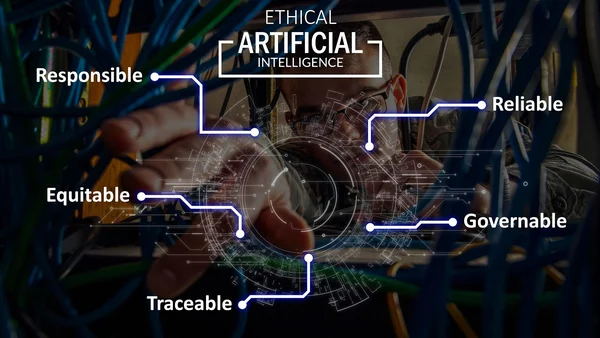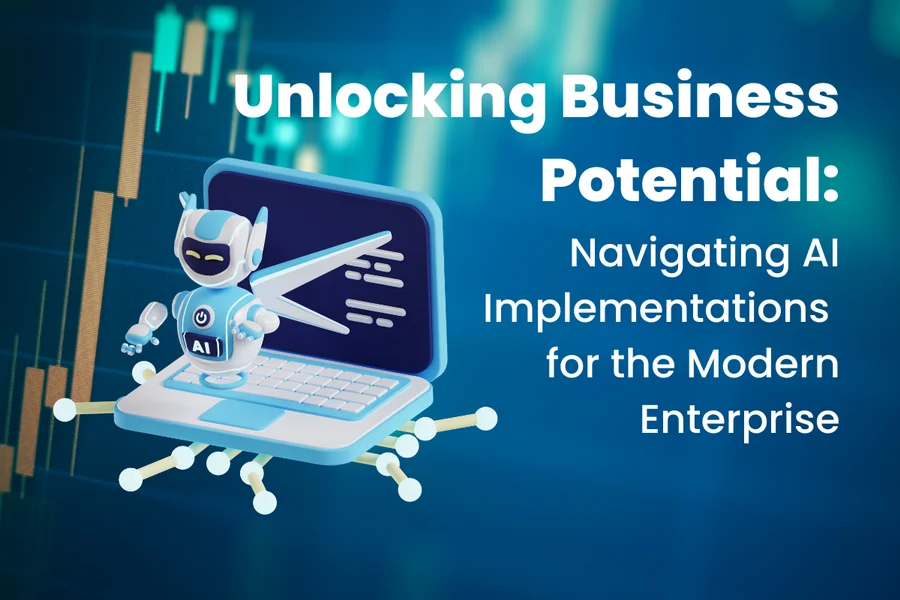In today’s fast-paced business landscape, staying competitive and relevant often hinges on the successful integration of cutting-edge technologies. Among these, Artificial Intelligence (AI) has emerged as a game-changer, transforming the way companies operate and make decisions. At CodingIT, we specialize in custom software development, including proprietary AI systems, and we understand the profound impact AI can have on your business. In this article, we’ll explore the benefits of implementing AI into your workflows, the challenges you might encounter, and the shift in perspective required for a successful AI integration.
- The Transformative Power of AI in Business
- Challenges in AI Implementation
- Shifting Perspectives: Treating Your Business Like a Software Provider
- Best Practices for Successful AI Implementation
- Conclusion
The Transformative Power of AI in Business
AI has transcended its status as a buzzword to become a fundamental force driving business evolution. Here are some compelling reasons why businesses across various industries are embracing AI:
1. Enhanced Efficiency
AI’s ability to automate repetitive and time-consuming tasks has revolutionized the workplace. By delegating routine chores to AI-driven systems, employees can redirect their efforts toward more strategic and creative endeavors. For instance, AI can streamline customer support by handling common inquiries, freeing up human agents to focus on complex issues and personalized interactions. In supply chain management, AI algorithms optimize inventory levels, reduce waste, and enhance logistics efficiency, ultimately saving both time and resources.
2. Data-Driven Decision-Making
In the era of big data, the analytical prowess of AI is indispensable. AI systems excel at processing vast datasets, extracting valuable insights, and uncovering hidden patterns. This capability empowers businesses to make well-informed decisions. By leveraging AI, companies can identify market trends, anticipate consumer behavior, and predict future outcomes with a level of accuracy that was once unattainable. This data-driven approach minimizes risks and maximizes opportunities.
3. Improved Customer Experiences
AI has ushered in a new era of customer interactions. Chatbots powered by AI algorithms provide real-time support and assistance, ensuring round-the-clock availability and swift response times. Moreover, personalization algorithms use customer data to tailor product recommendations, content, and marketing messages, creating a highly individualized experience for each customer. This personal touch fosters customer loyalty, satisfaction, and, ultimately, increased revenue.
4. Competitive Advantage
Businesses that successfully integrate AI into their operations gain a significant competitive edge. They possess the agility to innovate rapidly, adapt to dynamic market conditions, and outpace their competitors. By leveraging AI for market research, trend analysis, and customer insights, these companies can fine-tune their strategies and stay one step ahead of the competition. As a result, they are better positioned to capitalize on emerging opportunities and navigate industry challenges with greater confidence.
Incorporating AI into business processes is no longer a luxury; it is a strategic imperative for achieving operational excellence, driving growth, and maintaining a leadership position in today’s highly competitive business landscape. AI is not just a tool; it is the engine powering the next phase of business evolution, enabling companies to unlock their full potential and chart a course toward a more prosperous future.

Challenges in AI Implementation
While the potential benefits of AI are compelling, implementing AI into your business workflows is not without its challenges. Here are some common hurdles:
Hallucinations and Inaccurate Responses
AI systems, although remarkably advanced, are not infallible. They can occasionally produce unexpected or inaccurate results, a phenomenon often referred to as “hallucinations.” These errors can range from misinterpretations of data to unintended biases in decision-making processes. To mitigate these risks, rigorous testing and validation procedures are essential. Comprehensive testing helps identify and rectify potential issues, ensuring the reliability and accuracy of AI systems before they are deployed in mission-critical tasks.
Team Education and Training
Leveraging AI effectively necessitates more than just having advanced technology in place. It requires a well-prepared workforce that understands both the capabilities and limitations of AI. Proper education and training programs are indispensable to equip team members with the knowledge and skills needed to harness AI’s full potential. This encompasses not only technical aspects but also an understanding of AI’s ethical considerations, ensuring responsible use across the organization.
Protecting Company Assets and Intellectual Property
AI thrives on data, processing vast volumes of information to derive insights and make decisions. As data becomes the lifeblood of AI systems, data security and Intellectual Property (IP) protection take center stage. Ensuring that your AI systems safeguard sensitive information is not just a compliance requirement but also critical to maintaining trust with customers, partners, and stakeholders. Robust data encryption, access controls, and proactive monitoring are among the measures essential to shield your company’s assets and IP.
Human Oversight
AI is a tool that should augment human decision-making, not replace it entirely. Human oversight is imperative, particularly in critical applications like healthcare and finance, where errors can have severe consequences. Responsible AI use necessitates a governance framework that incorporates human judgment and intervention when needed. This oversight ensures that AI systems operate ethically and in alignment with established guidelines, providing an additional layer of assurance against unintended outcomes.
Navigating these challenges demands a comprehensive approach to AI implementation. It involves not only technical prowess but also a commitment to ethical AI practices, ongoing learning, and proactive safeguards. Businesses must recognize that AI is a powerful tool, but its effective and responsible use requires a holistic strategy that extends beyond technology alone. In doing so, they can harness the full potential of AI while mitigating risks and advancing their objectives with confidence.
Shifting Perspectives: Treating Your Business Like a Software Provider
To embark on a successful AI journey, businesses must adopt a mindset akin to that of a software provider—a mindset characterized by strategic thinking, continual improvement, and an unwavering commitment to innovation. Let’s delve deeper into what this shift in perspective truly entails:
Embracing Continuous Improvement
AI is not a quick fix; it’s a long-term investment. To harness the full potential of AI, companies must embrace the philosophy of continuous improvement. This means acknowledging that AI systems are not static entities but dynamic solutions that must evolve to remain relevant. As market dynamics change and customer expectations evolve, your AI systems should adapt accordingly. Regular refinements, updates, and enhancements are essential to keep pace with evolving requirements, ensuring that your AI solutions continue to deliver value over time.
Setting Clear Objectives
Before embarking on an AI project, clarity of purpose is paramount. Define clear objectives and goals for your AI initiatives. What specific problems do you want AI to address? What outcomes do you expect to achieve? Establishing well-defined goals is like plotting your AI journey on a detailed roadmap. It not only guides the development process but also serves as a benchmark for measuring success. Moreover, clear objectives align your team’s efforts, ensuring that everyone understands the ultimate mission of the AI project and how it contributes to broader organizational goals.
Collaboration Across Teams
AI implementation is a multidisciplinary endeavor that demands seamless collaboration across different functional areas within your organization. Technical teams, such as data scientists and engineers, need to work closely with non-technical teams, including marketing, sales, and operations. This collaboration is essential to ensure that AI solutions align with broader business strategies and address specific pain points. Effective communication between technical and non-technical stakeholders fosters a holistic understanding of how AI can be leveraged to drive innovation, streamline operations, and enhance customer experiences.
Innovation and Adaptation
In the realm of AI, stagnation is not an option. The pace of AI technology evolution is relentless. To stay ahead of the curve, businesses must not only embrace innovation but also be willing to adapt continuously. This means actively monitoring advancements in AI research and technology, exploring emerging trends, and evaluating their potential impact on your business. A proactive approach to innovation ensures that your AI solutions remain competitive and capable of meeting evolving customer needs. It positions your business as a pioneer in your industry, ready to seize new opportunities as they arise.
In conclusion, treating your business like a software provider is the key to unlocking the true potential of AI. This perspective shift involves committing to continuous improvement, setting clear objectives, fostering collaboration across teams, and embracing innovation and adaptation. By adopting this mindset, your organization can not only effectively implement AI but also thrive in an ever-changing business landscape, remaining agile, competitive, and future-ready.

Best Practices for Successful AI Implementation
To help you navigate the world of AI implementation effectively, here are some best practices that we can share:
1. Start with a Pilot Project
Embarking on your AI journey can be daunting. To mitigate risks and gain valuable insights, start with a pilot project. A small-scale AI initiative allows you to test the waters, assess the feasibility of your ideas, and build internal expertise gradually. This approach provides a controlled environment to experiment with AI technologies, identify potential challenges, and refine your strategy before scaling up. A successful pilot project serves as a proof of concept, instilling confidence within your organization and laying the foundation for broader AI adoption.
2. Invest in Training
The successful integration of AI hinges on a knowledgeable and skilled workforce. Invest in education and training programs to empower your team members with the competencies required to harness AI’s full potential. Beyond initial training, emphasize the importance of continuous learning. AI is a rapidly evolving field, with new advancements and best practices emerging regularly. Encourage your team to stay updated on the latest developments, attend workshops, and engage in online courses. A well-trained and adaptable workforce is a critical asset in ensuring the sustained success of your AI initiatives.
3. Monitor and Evaluate
AI systems are not static; they require ongoing attention and monitoring. Establish robust mechanisms for continuously evaluating the performance of your AI solutions. Collect data on system behavior, user interactions, and outcomes. Solicit feedback from users and stakeholders to identify areas for improvement. By analyzing real-world usage and feedback, you can fine-tune your AI systems, address issues promptly, and enhance their effectiveness over time. Effective monitoring and evaluation ensure that your AI solutions remain aligned with your objectives and continue to deliver value.
4. Collaborate with Experts
The complexities of AI implementation often necessitate collaboration with experienced professionals. Partnering with AI developers and consultants who have a proven track record, such as CodingIT, can streamline your journey to AI success. These experts bring specialized knowledge, best practices, and a wealth of experience to the table. They can help you make informed decisions, select the most suitable AI technologies, and design robust implementation strategies. Furthermore, their expertise can expedite the development process, mitigate risks, and ensure a smooth and successful AI integration.
Incorporating these best practices into your AI implementation strategy equips your organization with a strong foundation for success. Starting with a pilot project builds confidence, investing in training empowers your team, monitoring and evaluation drive continuous improvement, and collaborating with experts accelerates your progress. By adhering to these principles, you can harness the transformative power of AI while minimizing risks and maximizing the impact of your AI initiatives.
Conclusion
Incorporating AI into your business operations is no longer a choice; it’s a necessity for staying competitive in today’s market. However, the journey to successful AI integration is not without its challenges. By embracing a software provider mindset, setting clear objectives, and collaborating with experts, you can unlock the full potential of AI for your business.
At CodingIT, we are committed to helping our clients harness the power of AI while retaining full control of their Intellectual Property and data. Contact us today to explore how our custom software development and AI solutions can elevate your business to new heights. Embrace AI, innovate continuously, and secure your position as a leader in your industry.
